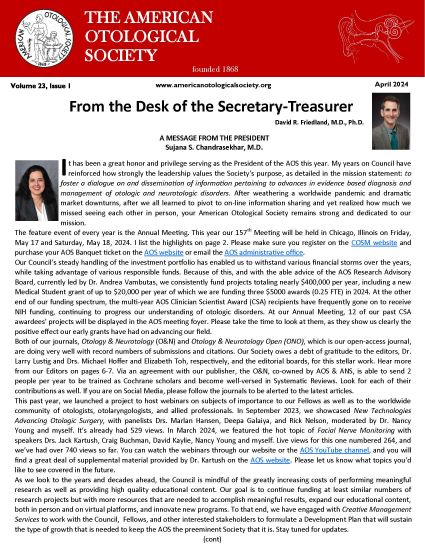AOS CLINICIAN SCIENTIST AWARD
The following individuals received a Clinician Scientist Award. Many have gone on to receive NIH K-Award funding.
CLINICIAN SCIENTIST AWARD RECIPIENT HISTORY
| PI NAME |
NIH FUNDS RECEIVED |
INSTITUTE |
GRANT NAME |
AOS FY FUNDING |
| Doherty, Joni |
K08 (3)
DOD
|
UCSD |
ErbB receptor regulation of Vestibular Schwannomas |
2007-2008 |
| Cheng, Alan |
K08;
three R01's; R25; U24; Y32 |
Stanford University |
Differentiation of Inner Ear Stem Cells |
2009-2010 |
| Stankovic, Konstantina |
K08; R01 |
Massachusetts Eye and Ear Infirmary |
Molecular Mechanisms of Noise-Induces Delayed Primary Auditory Neuropathy |
2009-2010 |
| Crane, Benjamin |
R01 (2); K23 |
University of Rochester |
Visual and Vestibular Percepts of Motion |
2010-2011 |
| Agrawal, Yuri |
K23; R03; R01 |
Johns Hopkins University |
Influence of Vestibular Dysfunction on Fall Risk in Older Individuals |
2012-2014 |
| Santos, Felipe |
U24 |
Massachusetts Eye & Ear Infirmary |
Epigenetic Regulation of Hair Cell Regeneration in Zebrafish Lateral Line |
2012-2013 |
| Matsuoka, Akihiro |
K08 |
Northwestern University |
Nanotechnological Regeneration of Spiral Ganglion Neurons with Human Stem Cells |
2012-2013 |
| Horn, David |
K23, R01 |
University of Washington |
Spectral and Temporal Resolution in Infants with Cochlear Implants |
2013-2014 |
| Basura, Gregory J. |
R03; R21 |
University of Michigan |
Multi-Sensory Modulation of Tinnitus Correlates in Primary Auditory Cortex |
2014-2017 |
| Gurgel, Richard K. |
R03; R21 |
University of Utah |
Exploring the Impact of Hearing Loss on Impaired Cognition in Older Adults |
2015-2018 |
| Moberly, Aaron |
K23
R01 (2)
|
The Ohio State University
Vanderbilt University Medical Center
|
Variability in Speech Recognition for Adults with Cochlear Implants
Predicting Speech Recognition in Adults Receiving Cochlear Implants
Computer-assisted diagnosis of ear pathologies by combining digital otoscopy with complementary data using machine learning
|
2016-2017 |
| Ward, Bryan K. |
K23;
U24 (2024) |
Johns Hopkins University |
Magnetic Resonance Imaging to Observe Magnetic Vestibular Stimulation |
2019-2021 |
| Kohlberg, Gavriel |
|
University of Washington |
Use of multisensory input and deep learning techniques to develop a next generation listening device to improve speech perception in noise for individuals with hearing loss |
2020-2023 |
| Shibata, Seiji B. |
K08 |
University of Southern California
(USC) |
Cellular Reprogramming of Peripheral Glial Cells to Regenerate Primary Auditory Neurons |
2021-2024
|
Please click here for guidelines for the CSA Award.
Candidates for this award must: 1) have completed an ACGME-approved residency in Otolaryngology-Head and Neck Surgery and 2) hold a full-time teaching appointment in a US medical school within a department or division of Otolaryngology-Head and Neck Surgery 3) be citizens of the United States, or have been lawfully admitted for permanent United States residency at the time of application; 4) hold a Doctor of Medicine (MD) or equivalent degree from an accredited institution awarded within the last 10 years; and 5) have demonstrated the capacity or potential for a highly productive, independent research career with an emphasis in otology/neurotology. Preference will be given to candidates who have recently (within the preceding three years) completed, or are currently enrolled in a two-year otology/neurotology fellowship.
The AOS Clinician-Scientist and his or her mentor(s) are encouraged to use preliminary research results from this award as pilot material for the development of a research grant application to a suitable funding agency. Specifically, this grant mechanism is designed to permit the budding clinician-scientist adequate time and mentoring to accrue preliminary data to successfully apply for a K08/K23 grant from the NIH. Therefore, individuals who have already competed successfully for a career development award from a private or Federal funding agency are ineligible for this award program. The grantee may not receive concurrent research salary support from other agencies or sources during the period of this grant. Accordingly, funding from the AOS will be terminated once the Clinician-Scientist secures Federal funding for a Career Development Award.
|


